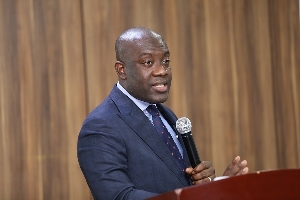 Minister for Works and Housing, Kojo Oppong Nkrumah
Minister for Works and Housing, Kojo Oppong Nkrumah
The Minister of Works and Housing, Kojo Oppong Nkrumah, has emphasised the urgent need to tackle the high housing deficit in the country, which currently stands at approximately 1.8 million units.
Speaking at the Ghana Real Estate Developers Association’s (GREDA) Annual CEO’s Breakfast Meeting in Accra, Mr. Nkrumah acknowledged the challenges faced by the housing sector and called for a recalibration in the approach to housing delivery in the country.
Mr. Nkrumah pointed out that while 58 percent of the country’s population resides in urban areas with an urbanisation rate of 3.3 percent, a significant portion of the housing stock remains unoccupied, standing at 12.7 percent.
“This level of urbanisation presents various opportunities and challenges. But none are as pressing as a housing deficit, which currently amounts to approximately about 1.8 million units and requires immediate and focused attention. This presents a stark image of a housing situation, clearly showing that our approach to housing delivery requires some recalibration,” the minister noted.
Additionally, due to high cost of housing, he noted that 21.3 percent of surveyed houses are in substandard conditions, including mental containers, wooden structures and kiosks.
Addressing the challenges within the industry, Nkrumah urged stakeholders to overcome obstacles such as the high cost of financing for housing and the low savings culture.
He reiterated the need to explore alternative technologies, such as hydroform, laterite and interlocking blocks, to reduce construction costs and overcome material shortages.
Dr. Kwadwo Ohene Sarfo, a housing practitioner, noted the need to reduce social stratification in housing, citing examples of stark wealth disparities along certain highways that could lead to criminal activities.
Patrick Ebo Bonful, President of GREDA, on his part, called for a review of the Mortgage Act 2008(Act 770) to address challenges faced by financial institutions in providing home loans. He advocated broader access to mortgages beyond traditional financial institutions to include cooperatives and non- deposit institutions.
“GREDA believes that something must be done about our law so that the financial institutions would be comfortable to move into that sector. Again, the current law precludes non-financial institutions and corporations from advancing home mortgages,” he explained.
In response to the challenges, Nkrumah announced government initiatives to establish a housing fund and a housing authority to provide financial support and regulatory oversight for large-scale housing projects. He encouraged GREDA members to collaborate with the ministry to develop comprehensive strategies to address the sector’s challenges and capitalise on opportunities identified during the meeting.
The minister’s call for immediate action underscores the gravity of Ghana’s housing deficit and the need for concerted efforts from both the public and private sectors to alleviate the housing crisis and ensure access to affordable and decent accommodation for all citizens.